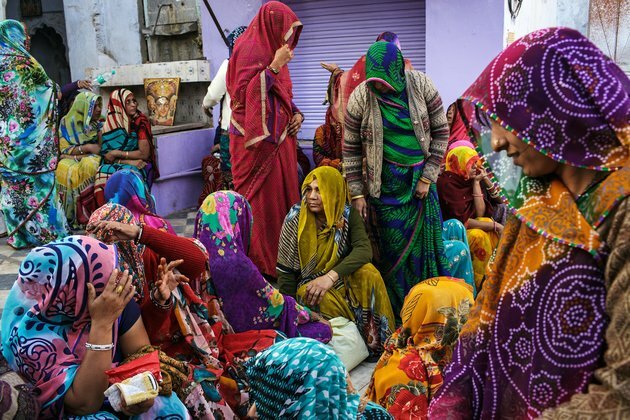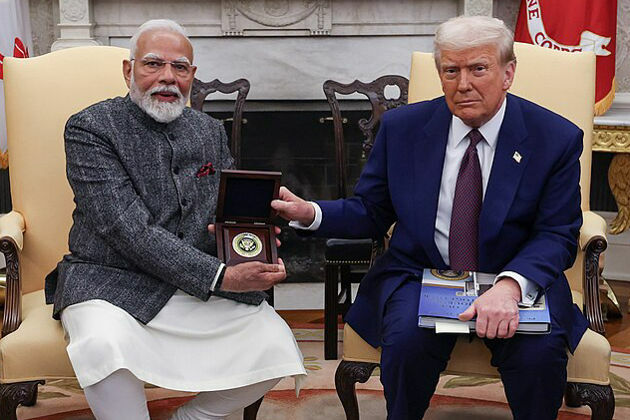Death and dying: how different cultures deal with grief and mourning
The Conversation
25 Jan 2023, 20:09 GMT+10

Grief is a universal emotion. It's something we all feel, no matter where we come from or what we've been through. Grief comes for us all and as humans who form close relationships with other people, it's hard to avoid.
Studies of grieving brains - be it scans of the brain regions which process grief, or measures of the stress hormone cortisol that is released in grief - show no differences in relation to race, age or religion. People of all cultures grieve; we all feel sorrow, loss, and despair. We just do it - and show it - in different ways.
James Averill, a US professor of psychology, has compared this to sexual feelings which, like grief, are biologically driven but expressed in elaborately different social contexts.
Here are several examples that demonstrate how grief and mourning can look very different depending on where you live and come from.
1. Collective grief is common
When it comes to grieving in the west, the focus is often placed on the individual. People talk about their personal grief, and counselling is usually arranged for just one person - even support groups are attended by individual members. But the reality is that the family - or for many Indigenous people, the tribe - grieves collectively, and in some cultures this is more pronounced than others.
In Hindu families in India, for example, relatives and friends come together to support the immediate family in an elaborate 13-day ritual. A widow ceases to be the head of the household and her place is taken by the wife of her oldest son.
Typical of Native American culture, the Lakota tribe elders use the phrase "mitakuye oyasin", meaning "we are all related". The death of anyone in the tribe is felt by all.
In Tibet, the Buddhist mourning period following a funeral lasts 49 days. During this time the family gathers to make clay figures and prayer flags, allowing for a collective expression of grief.
Collective grief is also the norm in traditional Chinese culture, but here the family also makes collective decisions - which sometimes exclude the dying person. This was seen in the 2019 film The Farewell, which was based on director and writer Lulu Wong's real life. In the film, a Chinese family discovers their grandmother has only a short time left to live and decides to keep her in the dark, scheduling a wedding in order to gather before she dies.
2. Grieving times vary by culture
After a bereavement, a steady return to normal functioning can typically take two or more years. Experts no longer talk of "moving on", but instead see grief as a way of adapting to loss while forming a continuing bond with the lost loved one. But again, this varies from culture to culture.
In Bali, Indonesia, mourning is brief and tearfulness is discouraged. If family members do cry, tears must not fall on the body as this is thought to give the person a bad place in heaven. To cry for too long is thought to invoke malevolent spirits and encumber the dead person's soul with unhappiness.
In Egypt, tearfully grieving after seven years would still be seen as healthy and normal - whereas in the US this would be considered a disorder. Indeed, in the west, intense grief exceeding 12 months is labelled "prolonged grief disorder".
3. People like to visit the body
The way people interact with the dead body also differs culturally. For example, between the death and the funeral, the Toraja people on the island of Sulawesi, Indonesia, treat their relative as if they were ill rather than dead, by bringing them food and keeping them company.
Europe has its own customs. In the UK until the mid-20th century, along the Yorkshire coast, the lying-out of the body was done by women of the village. Friends and family would come to view the deceased, pay their respects, and recall memories of the person. This practice continues in some countries.
In Italy, for example, a temporary refrigerated coffin is delivered to the family home so people can bring flowers and pay their respects in the immediate aftermath of the death.
4. Signs from above
In the UK, some people believe that white feathers are a message from heaven, though this is often dismissed as childlike magical thinking. But in many African societies, spiritual connection to the deceased is considered normal and very real.
In sub-Saharan Africa, the traditional belief is that the dead become spirits but remain in the living world on Earth. They are thought of as the living dead. The spirit may appear in dreams in their human form.
5. Sending on the spirit
The Māori people indigenous to New Zealand set aside time to grieve and mourn. They perform rites for the dead in a process called "tangihanga". First, rituals send on the spirit, then the body is prepared by an undertaker, often helped by family members. The body returns to the family home for the family to reminisce in celebration.
Elaborate rituals follow, including dances and songs and finally a farewell speech. Traditional artefacts including clothes, weapons and jewellery are displayed. After the funeral, there is a ritual cleansing of the deceased's house and feasting, before an eventual unveiling of the headstone.
Author: John Frederick Wilson - Honorary Research Fellow, Director of Bereavement Services Counselling & Mental Health Clinic, York St John University 
 Share
Share
 Tweet
Tweet
 Share
Share
 Flip
Flip
 Email
Email
Watch latest videos
Subscribe and Follow
Get a daily dose of New Orleans Sun news through our daily email, its complimentary and keeps you fully up to date with world and business news as well.
News RELEASES
Publish news of your business, community or sports group, personnel appointments, major event and more by submitting a news release to New Orleans Sun.
More InformationBusiness
SectionEngine defect prompts Nissan to recall over 443,000 vehicles
FRANKLIN, Tennessee: Hundreds of thousands of Nissan and Infiniti vehicles are being recalled across the United States due to a potential...
Microsoft trims jobs to manage soaring AI infrastructure costs
REDMOND, Washington: Microsoft is the latest tech giant to announce significant job cuts, as the financial strain of building next-generation...
Stocks worldwide struggle to make ground Friday with Wall Street closed
LONDON UK - U.S. stock markets were closed on Friday for Independence Day. Global Forex Markets Wrap Up Friday with Greeback Comeback...
Nvidia briefly tops Apple’s record in AI-fueled stock rally
SANTA CLARA, California: Nvidia came within a whisker of making financial history on July 3, briefly surpassing Apple's all-time market...
ICE raids leave crops rotting in California, farmers fear collapse
SACRAMENTO, California: California's multibillion-dollar farms are facing a growing crisis—not from drought or pests, but from a sudden...
Trump signals progress on India Trade, criticizes Japan stance
WASHINGTON, D.C.: President Donald Trump says the United States could soon reach a trade deal with India. He believes this deal would...
International
SectionTragedy in Spain: Diogo Jota and his brother die in car accident
MADRID, Spain: Liverpool footballer Diogo Jota and his younger brother, André Silva, have died in a car accident in Spain. Spanish...
Early heatwave grips Europe, leaving 8 dead and nations on alert
LONDON, U.K.: An unrelenting heatwave sweeping across Europe has pushed early summer temperatures to historic highs, triggering deadly...
U.S. military, China, Russia in Space race
President Donald Trump's plans to build a space-based Golden Dome missile defense shield have drawn immediate criticism from China,...
Trump wins $16 million settlement from Paramount over CBS Harris edit
NEW YORK CITY, New York: Paramount has agreed to pay US$16 million to settle a lawsuit brought by U.S. President Donald Trump over...
British PM faces major party revolt over welfare reforms
LONDON, U.K.: British Prime Minister Keir Starmer won a vote in Parliament this week to move ahead with changes to the country's welfare...
White House meeting between Trump, Netanyahu on July 7
WASHINGTON, D.C.: President Donald Trump will meet Israeli Prime Minister Benjamin Netanyahu at the White House on Monday. President...













